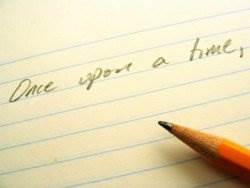What's in a name?
Published on: 06 November 2013 Author: Alex Strick
Negative disability-related words and phrases still all too often rear their ugly heads in children's books. Here, Alex Strick suggests ten words best avoided when talking about disabled people.

A recent Twitter discussion prompted me to consider the number of negative disability-related words and phrases which still seem to rear their ugly heads in children's books, manuscripts, articles and reviews.
The result? Ten words, phrases and concepts which might be best avoided when talking about disabled people. So, in no particular order:
1. Brave
I've lost count of the number of times I've read about a disabled person described as being brave, plucky or courageous. Whilst it might be intended to be a compliment, the result is generally rather more patronising. Okay, the media is the worst offender, but children's books can play a vital role in countering this habit.
2. Handicapped
Whether or not one believes that this term originates from the idea of going 'cap in hand' (or begging), it is undoubtedly an old-fashioned term. Irrespective of its etymology, if we are trying to talk about disabled people in a positive and empowering way, I'd say let's banish it, along with words like 'weakly' and 'invalid'.
3. 'Wheelchair-bound' or 'confined to a wheelchair'
These are such unconstructive and misleading phrases, as people do not of course live permanently in their wheelchairs. Try thinking instead about a wheelchair as being equivalent to a pair of shoes, to help to get someone around.
4. The R word
Whether describing someone as being 'mentally retarded', using 'retard' as an insult or any indeed employing the R word in any other permutation, this is a really offensive term for many people.
5. 'In spite of her disability'
In this double-whammy, the idea of being able to do something 'despite' being disabled is less than helpful, and appending the disability to the person makes for an even more old-fashioned and 'medical model' expression.
6. Crippled
Too often used as an alternative to 'disabled' (particularly historically), this word has damaging and often inaccurate connotations. By using such terms we risk reinforcing the idea of the disabled person as a helpless, struggling victim.
7. 'Spaz', 'Spazzo', 'Freak' and 'Crip'
Words like these are sometimes seen as being acceptable, either because they have (arguably) been reclaimed by the disability rights movement or are perceived as being authentic 'teen talk'. My advice? Find alternative teen slang which doesn't risk simply perpetuate negative associations and stereotypes.
7. 'Psycho' and 'Mental'
Again, I would say we have a vast vocabulary at our convenience, so let's find alternatives to cheap slurs or negative terms relating to mental health. Along the same lines, it would be great to avoid jokes about 'being bipolar' or ' a bit OCD', which risk trivialising such conditions.
9. Mental age
Stating that someone has 'the mental age of a five year old' actually tells you little about that person and instead instantly creates all sorts of assumptions. It also wrongly suggests a permanent state, despite the fact that we are all constantly learning and developing.
10. Special
Whilst it may be used with all best intentions, for many disabled people this word carries negative associations and is seen as patronising and dated. I say avoid it, along with 'special needs child' and 'Downs boy'.






Add a comment